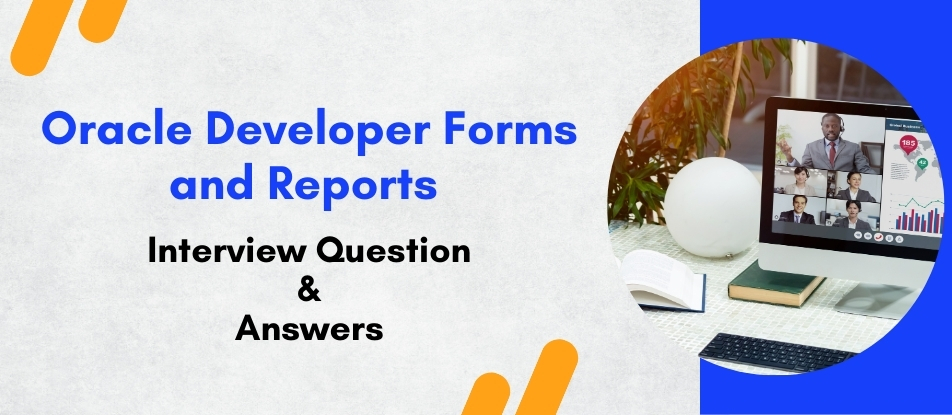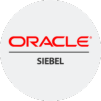
The Oracle Developer Forms and Reports training course is designed to provide in-depth knowledge of building and managing data-centric applications. Participants will learn to create interactive forms, generate customized reports, and integrate them with Oracle databases. The course covers key concepts like triggers, validations, and report formatting, enabling learners to develop efficient, scalable enterprise solutions. Ideal for developers aiming to enhance their Oracle application development skills.
Oracle Developer Forms and Reports Training Interview Questions Answers - For Intermediate
1. What is a canvas view and how does it differ from a window in Oracle Forms?
A canvas view defines the layout and visual representation of interface elements, like text fields and buttons, within a window. While canvases control the content displayed, windows act as containers that hold canvases. Multiple canvases can be associated with a single window to manage complex layouts.
2. How can you create a custom alert in Oracle Forms?
Custom alerts in Oracle Forms are created using the Alert object. Developers can define alert properties like title, message text, and button labels. The SHOW_ALERT function is used to display the alert during runtime. Alerts are useful for providing messages or warnings to users.
3. What is the purpose of the PRE-QUERY trigger in Oracle Forms?
The PRE-QUERY trigger fires before a query is executed. It is commonly used to modify or restrict query criteria dynamically by setting specific WHERE conditions. This ensures that only relevant data is fetched based on the user's input or predefined conditions.
4. How do you manage user navigation in Oracle Forms?
User navigation is managed by setting properties such as NEXT_ITEM or PREVIOUS_ITEM to control the flow of data entry. Triggers like WHEN-NEW-ITEM-INSTANCE or KEY-NEXT-ITEM can also be used to customize navigation, enabling smoother user interaction.
5. What is an object group in Oracle Forms, and how is it used?
An object group is a container for logical grouping of objects like items, blocks, and triggers. It is used for reusability, allowing the developer to copy and reuse objects across multiple forms. This simplifies the development process and promotes consistency.
6. How can you create a dynamic LOV in Oracle Forms?
A dynamic LOV can be created by defining a record group with a runtime SQL query. This record group is then attached to the LOV. The LOV can be refreshed dynamically based on conditions or user input, ensuring that the data presented is always relevant and updated.
7. What is the role of the POST-QUERY trigger in Oracle Forms?
The POST-QUERY trigger fires after a record is retrieved from the database. It is used for tasks like formatting or calculating additional fields based on the fetched data. It ensures that data modifications or formatting are applied after retrieval but before display.
8. How do you manage multiple reports from Oracle Forms?
Multiple reports can be managed using multiple RUN_REPORT_OBJECT calls within Oracle Forms. Each call can be parameterized and configured to execute different reports. The results can be displayed sequentially or simultaneously, depending on the application requirements.
9. What is a transactional trigger and where is it used in Oracle Forms?
Transactional triggers, such as PRE-INSERT, PRE-UPDATE, and PRE-DELETE, control operations on database records. They are used to enforce business rules, validate data, or set default values before a transaction is processed, ensuring data integrity.
10. How can you implement cascading LOVs in Oracle Forms?
Cascading LOVs are implemented by dynamically modifying the LOV's SQL query based on the selection in another LOV. This is typically done in the WHEN-NEW-ITEM-INSTANCE or WHEN-VALIDATE-ITEM trigger, ensuring the second LOV displays only relevant options.
11. How do you handle multi-record blocks in Oracle Forms?
Multi-record blocks allow multiple rows of data to be displayed simultaneously. Properties such as NUMBER OF RECORDS DISPLAYED are set to control the number of rows shown. Navigation and data handling are managed using standard triggers and built-in procedures.
12. How can you manage security and access control in Oracle Forms?
Security is managed by creating roles and privileges within the Oracle Database and validating user access through Forms triggers like WHEN-NEW-FORM-INSTANCE. Access to specific data blocks, items, or reports can be restricted based on user roles.
13. What is a non-database block in Oracle Forms?
A non-database block is not directly associated with any database table. It is used for temporary data storage, calculations, or as a control interface. These blocks provide flexibility for managing temporary or calculated data within the form.
14. How can you improve the performance of Oracle Forms applications?
Performance can be improved by optimizing SQL queries, reducing unnecessary database calls, using bind variables, and properly indexing tables. Additionally, minimizing the use of heavy graphical elements and optimizing trigger logic enhances form performance.
15. What is the difference between synchronous and asynchronous report execution in Oracle Reports?
Synchronous execution means the form waits for the report to complete before proceeding, while asynchronous execution allows the form to continue processing while the report runs in the background. Asynchronous execution is suitable for long-running reports to enhance user experience.
Oracle Developer Forms and Reports Training Interview Questions Answers - For Advanced
1. How can you implement session management in Oracle Forms for multi-user environments?
Session management in Oracle Forms involves tracking and controlling user sessions to ensure efficient resource utilization. This can be done using global variables to store session-specific data and leveraging triggers like WHEN-NEW-FORM-INSTANCE to initialize session details. Using Oracle's DBMS_SESSION and DBMS_APPLICATION_INFO packages allows for monitoring and controlling user sessions. Additionally, implementing timeouts for idle sessions and proper logout mechanisms ensures that inactive sessions are terminated, improving system performance and security.
2. How do you ensure data integrity when multiple users are accessing the same data in Oracle Forms?
Data integrity in a multi-user environment can be maintained using database locks, such as optimistic or pessimistic locking strategies. Optimistic locking uses version numbers or timestamps to detect conflicts during data updates. Pessimistic locking involves locking records when a user starts editing, preventing other users from modifying the same data. Triggers like WHEN-VALIDATE-ITEM can be used to check for changes before committing. Additionally, Oracle Forms' built-in concurrency mechanisms, like record-level locking, help prevent conflicts and ensure data consistency.
3. How do you handle complex data migration between different Oracle databases using Oracle Reports?
Data migration using Oracle Reports can be handled by designing reports that extract data in specific formats like CSV or XML. These reports can be parameterized for dynamic filtering and scheduled for execution during non-peak hours. PL/SQL procedures can be integrated within the reports to transform data during extraction. External tables and database links can also be used for seamless data migration across databases. After extraction, data validation reports can be generated to ensure the accuracy of migrated data.
4. How do you implement version control in Oracle Forms and Reports development?
Version control can be implemented using tools like Git or SVN. Oracle Forms and Reports files (in binary or text format) should be stored in a version control repository. Naming conventions and tagging practices can help identify versions. Using command-line utilities like frmcmp and rwconverter allows developers to convert binary files into text format, making it easier to track changes. Documentation for each version and consistent commit messages ensure better tracking and collaboration in a development environment.
5. What are the best practices for writing reusable code in Oracle Forms?
Reusable code can be implemented by creating modular program units like procedures, functions, and packages in PL/SQL. Property classes can be used to define common properties for multiple form items. Object libraries can encapsulate common objects, like alerts or buttons, for reuse across multiple forms. Using global variables and standardizing error handling procedures further enhances code reusability. Adopting consistent coding standards and commenting code blocks also ensures long-term maintainability.
6. How do you handle data encryption and decryption within Oracle Forms?
Data encryption within Oracle Forms can be implemented using Oracle's Transparent Data Encryption (TDE) for securing data at rest. For data in transit, secure the communication using SSL/TLS. Within the forms, encryption and decryption can be handled using PL/SQL functions like DBMS_CRYPTO for sensitive data fields. Additionally, sensitive data displayed on the form can be masked or partially hidden. Implementing role-based access control ensures that only authorized users can view or modify encrypted data.
7. How can you enhance the scalability of Oracle Forms and Reports in enterprise applications?
Scalability can be enhanced by deploying Oracle Forms and Reports on Oracle WebLogic Server with clustering and load-balancing configurations. Using connection pooling and optimizing database queries ensures efficient resource utilization. Reports can be scheduled during off-peak hours to minimize load. Optimizing form design by minimizing heavy graphics and reducing data-fetch size helps improve scalability. Regular monitoring and tuning of server parameters based on usage patterns also contribute to maintaining scalability.
8. How can you create dynamic and parameterized reports in Oracle Reports?
Dynamic reports are created by defining bind variables and system parameters that allow users to filter data during runtime. Using USER PARAMETERS in Oracle Reports, developers can design flexible prompts for users to enter criteria like date ranges or specific IDs. These parameters can be used in the SQL query to fetch filtered data. Format triggers and conditional layouts can be applied to modify report appearance based on parameters, ensuring dynamic content generation.
9. How do you implement security roles and permissions in Oracle Forms?
Security roles can be implemented by defining roles and privileges in the Oracle Database. Within Oracle Forms, triggers like WHEN-NEW-FORM-INSTANCE can check user roles and dynamically enable or disable form elements accordingly. Access can be restricted at the block or item level. For enhanced security, integrate with Oracle Identity Management for centralized user authentication. Auditing can be enabled to track user activities and maintain logs for security analysis.
10. How can you implement audit trails in Oracle Forms to track data changes?
Audit trails can be implemented using triggers like BEFORE INSERT, BEFORE UPDATE, and BEFORE DELETE to capture changes and store them in dedicated audit tables. Each audit record can contain the user ID, timestamp, and details of the change. For application-level audits, use global variables to track user actions and log them accordingly. Additionally, Oracle’s DBMS_FGA package can be used for fine-grained auditing of sensitive data.
11. What are some advanced techniques for optimizing report performance in Oracle Reports?
Advanced techniques for optimizing reports include using efficient SQL queries with appropriate indexing and minimizing data retrieval using proper WHERE clauses. Utilize bind variables instead of literals to prevent unnecessary hard parsing. Complex calculations should be processed in the database layer using PL/SQL packages. Implementing report-level caching can reduce processing time for frequently accessed reports. Additionally, minimizing complex formatting and using lighter templates help improve rendering speed.
12. How do you implement custom error messages in Oracle Forms and Reports?
Custom error messages can be implemented using predefined alerts in Oracle Forms. Triggers like ON-ERROR and ON-MESSAGE can intercept default errors and display custom messages using SHOW_ALERT. In Oracle Reports, custom error handling can be implemented using PL/SQL exception blocks to capture errors and display user-friendly messages. Additionally, messages can be logged into custom error tables for future analysis.
13. How can you ensure data synchronization between Oracle Forms and external systems?
Data synchronization can be achieved by integrating Oracle Forms with external systems through APIs or database links. Using Oracle’s Advanced Queuing (AQ) or Oracle GoldenGate ensures near-real-time data replication. Triggers can be used to capture changes and initiate synchronization processes. Batch jobs can be scheduled to synchronize large datasets periodically, ensuring data consistency across systems.
14. How do you manage multi-language support in Oracle Forms and Reports?
Multi-language support is implemented by defining resource files containing translations for different languages. Oracle Forms supports NLS_LANG settings to manage different languages. LOVs and alerts can be dynamically loaded based on the user’s language preference. For reports, templates can be designed with placeholders for dynamic text replacement. Unicode data types should be used for storing multi-language data in the database.
15. What strategies can be used to manage complex workflows in Oracle Forms?
Complex workflows can be managed by designing modular forms with clear navigation paths. Business logic should be encapsulated in PL/SQL packages and invoked through triggers. Using global variables to track workflow states ensures consistency. Custom alerts and messages can guide users through processes. Integration with Oracle Workflow provides advanced features like automated task routing and status tracking, enabling seamless management of complex business processes.
Course Schedule
| Apr, 2025 | Weekdays | Mon-Fri | Enquire Now |
| Weekend | Sat-Sun | Enquire Now | |
| May, 2025 | Weekdays | Mon-Fri | Enquire Now |
| Weekend | Sat-Sun | Enquire Now |
Related Courses
Related Articles
Related Interview
- Salesforce Billing Interview Questions Answers
- COBIT Foundation 2019 Training Interview Questions Answers
- Piping Design and Drafting Interview Questions Answers
- Certified Information Security Manager (CISM) Training Interview Questions Answers
- Palantir Foundry Data Science Interview Questions Answers
Related FAQ's
- Instructor-led Live Online Interactive Training
- Project Based Customized Learning
- Fast Track Training Program
- Self-paced learning
- In one-on-one training, you have the flexibility to choose the days, timings, and duration according to your preferences.
- We create a personalized training calendar based on your chosen schedule.
- Complete Live Online Interactive Training of the Course
- After Training Recorded Videos
- Session-wise Learning Material and notes for lifetime
- Practical & Assignments exercises
- Global Course Completion Certificate
- 24x7 after Training Support













 Join our Live Instructor-Led online classes delivered by industry experts
Join our Live Instructor-Led online classes delivered by industry experts